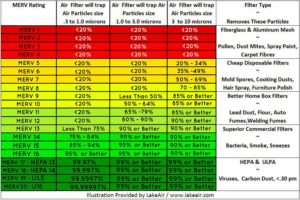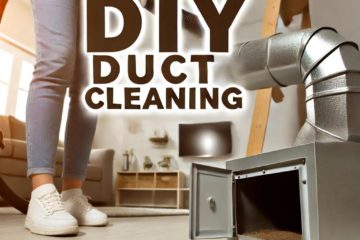Furnace Filters - What You Need To Know
A furnace filter is a device that is installed in a forced air heating or cooling system to remove contaminants from the air that is circulated through the system. The filter is typically made of fiberglass or synthetic material, and it is designed to trap dust, pollen, and other particles that can affect the air quality in your home.
It is important to regularly change the furnace filter to ensure that the heating and cooling system is operating efficiently and effectively. A dirty filter can restrict airflow, which can cause the system to work harder and use more energy. In addition, a dirty filter can contribute to poor indoor air quality, which can be harmful to your health.
To change the furnace filter, you will need to locate the filter housing, which is usually located near the blower or air handler. The filter will be held in place by a frame or a set of clips, and it can be removed by simply sliding it out of the housing. Once you have removed the old filter, you can replace it with a new one, making sure to insert it with the correct side facing up. It is generally recommended to change the filter every one to three months, depending on the type of filter and the level of air pollution in your home.
If you are unsure how to change the furnace filter or if you have any other questions about your heating and cooling system, it is always a good idea to consult with a professional HVAC technician.
Always check the MERV rating.
 The MERV (Minimum Efficiency Reporting Value) filter rating is a standard used to measure the effectiveness of air filters. The rating scale runs from 1 to 16, with higher numbers indicating a more efficient filter.
The MERV (Minimum Efficiency Reporting Value) filter rating is a standard used to measure the effectiveness of air filters. The rating scale runs from 1 to 16, with higher numbers indicating a more efficient filter.
Filters with a high MERV rating are able to remove smaller particles from the air, such as pollen, mold spores, and fine dust. These types of filters are often used in hospitals, laboratories, and other settings where air quality is a concern. However, they can also be used in residential settings to improve indoor air quality.
Filters with a lower MERV rating are less efficient at removing small particles, but they may be sufficient for everyday use in a home or office. The appropriate MERV rating for a given application will depend on the specific needs and preferences of the user.
It’s important to note that using a filter with a higher MERV rating may result in increased resistance to airflow, which can make it more difficult for your heating and cooling system to function effectively. Therefore, it’s important to choose a filter that is appropriate for your system and your needs.
Check this EPA website for more information
What is the minimum MERV rated filter I should have
The Minimum Efficiency Reporting Value (MERV) is a scale that is used to rate the effectiveness of air filters in trapping particles. The higher the MERV rating, the more effective the filter is at trapping smaller particles. The scale ranges from 1 to 20, with 20 being the most effective.
There is no one-size-fits-all answer to the question of what the minimum MERV rated filter should be, as it depends on a variety of factors, including the size of the room or space being filtered, the type of system the filter will be used in, and the specific needs and concerns of the person using the filter. Some general guidelines for selecting an appropriate filter based on MERV rating are:
For general use in a home or office, a filter with a MERV rating of 8 to 12 is typically sufficient. These filters are able to trap a wide range of common household pollutants, including dust, pollen, and mold spores.
For people with allergies or sensitivities to certain particles, a filter with a higher MERV rating, such as 13 to 16, may be more appropriate. These filters are able to capture smaller particles, including pet dander and smoke, which can trigger allergies and other respiratory issues.
For situations where the air quality is particularly poor, such as in a facility with high levels of pollution or in a building with a history of mold problems, a filter with a very high MERV rating, such as 17 to 20, may be necessary. These filters are able to capture extremely small particles, including bacteria and viruses, and are typically used in hospitals and other critical environments.
It’s important to note that while higher MERV rated filters are generally more effective at trapping particles, they can also be more difficult to maintain and may require more frequent replacement. It’s always a good idea to consult with a professional or refer to the manufacturer’s recommendations when selecting an air filter.
If I have a good filter do I need to duct clean as often?
A good air filter can help to reduce the amount of dust, dirt, and other particles that circulate through your heating and cooling system. However, it is still important to periodically clean your air ducts to ensure that they are free of debris and properly functioning. Here are a few reasons why you should consider cleaning your air ducts:
Improved indoor air quality: Over time, dirt, dust, and other particles can accumulate in your air ducts, which can be released into the air when the heating or cooling system is in use. By cleaning your air ducts, you can help to improve the air quality in your home and reduce the risk of respiratory issues.
Increased energy efficiency: When air ducts are clogged with dirt and debris, it can make it more difficult for your heating and cooling system to circulate air throughout your home. This can result in your system working harder and using more energy, which can drive up your energy bills. By cleaning your air ducts, you can help to ensure that your system is operating at peak efficiency.
In general, it is recommended to clean your air ducts every three to five years. However, the frequency of cleaning may vary depending on the age and condition of your ducts, as well as the presence of pets, allergies, and other factors. It is a good idea to consult with a professional HVAC technician to determine the best schedule for cleaning your air ducts.



